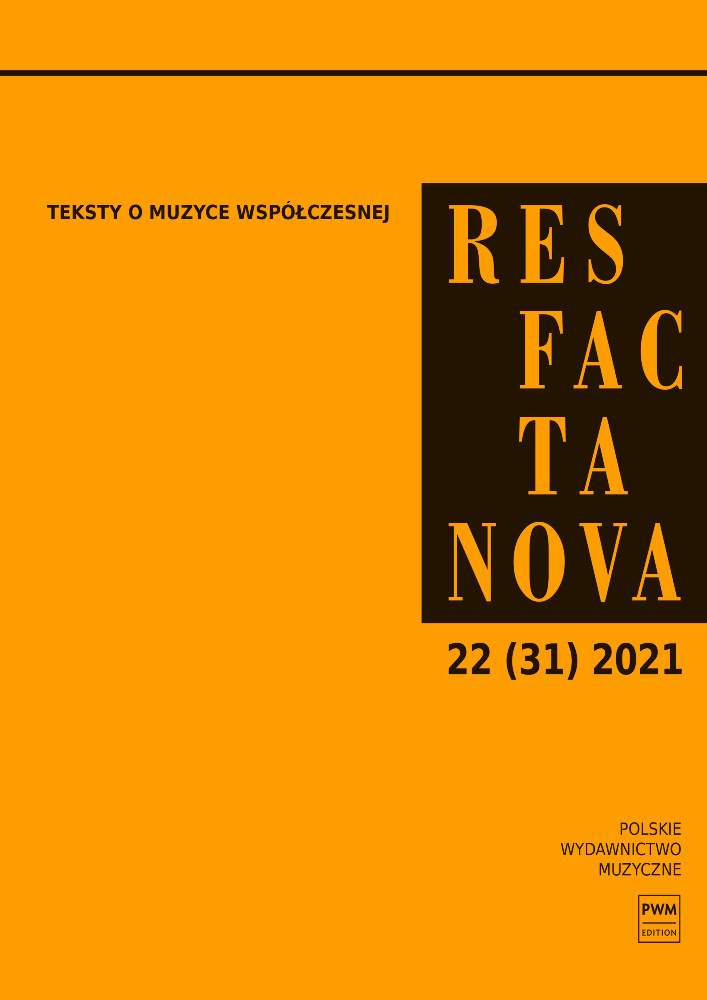Abstrakt
Opus 57 by Mieczysław Weinberg is undoubtedly one of the most beautiful and interesting vocal cycles in the composer’s oeuvre. The Gypsy Bible is closely linked to two figures Weinberg regarded as his masters: Julian Tuwim in the field of words, and Dmitri Shostakovich in the field of musical strategies. Verena Mogl in her publication “Juden die ins Lied sich retten” – der Komponist Mieczysław Weinberg (1919–1996) in der Sowjetunion draws attention to the mostly hidden or veiled references to the life and works of Shostakovich. They become the key to interpreting the cycle both in the context of the relationship between the authors and the political situation prevalent at that time. The article presents the most important threads concerning the biographical and artistic kinship between Weinberg and Tuwim, as well as the issues indicated by Verena Mogl, probably unknown to Polish readers. The appendix attached to the article contains all of Tuwim’s poems used in The Gypsy Bible along with the formal structure given to them by the composer. This is a new contribution to research on the creative output of Mieczysław Weinberg.
Bibliografia
Elphick Daniel, Commemorating the Past: Weinberg’s Experiences as a Jewish Migrant in the USSR, niepublikowane wystąpienie konferencyjne, https://www.academia.edu/10143768/Commemorating_the_Past_Weinbergs_Experiences_as_a_Jewish_Migrant_in_the_USSR (dostęp: 1.08.2021).
Elphick Daniel, Music behind the Iron Curtain: Weinberg and His Polish Contemporaries, Cambridge University Press, Cambridge 2020. https://doi.org/10.1017/9781108642774 DOI: https://doi.org/10.1017/9781108642774
Fanning David, Mieczysław Weinberg: In Search of Freedom, Wolke Verlag, Hofheim 2010.
Gwizdalanka Danuta, Mieczysław Wajnberg: kompozytor z trzech światów, Teatr Wielki im. Stanisława Moniuszki w Poznaniu, Poznań 2013.
Kowalska Hanna, Problem tożsamości narodowej w twórczości Juliana Tuwima, [w:] Literatura i/a tożsamość w XX wieku, red. Adrian Gleń, Irena Jokiel, Marek Szladowski, Uniwersytet Opolski – Instytut Filologii Polskiej, Opole 2007.
Nikitina Liudmiła, Sinfonie M. Wajnberga, Sovetsky Kompozitor, Moskwa 1972.
Nowok-Zych Agnieszka, Mieczysław Wajnberg a kategoria pogranicza, „Kwartalnik Młodych Muzykologów UJ”, 2020, nr 46(3), s. 41–53.
Nowok-Zych Agnieszka, Mieczysław Wajnberg i Julian Tuwim: inspiracje i paralele, [w:] Dzieło muzyczne wobec przeszłości i przyszłości, red. Anna Nowak, Akademia Muzyczna im. Feliksa Nowowiejskiego w Bydgoszczy, Bydgoszcz 2020, s. 257–269. https://doi.org/10.4467/23537094KMMUJ.20.011.12853 DOI: https://doi.org/10.4467/23537094KMMUJ.20.011.12853
Mogl Verena, „Juden die ins Lied sich retten” – der Komponist Mieczysław Weinberg (1919–1996) in der Sowjetunion, Waxmann, New York–Münster 2017.
Sawicka Jadwiga, Tuwim, Wiedza Powszechna, Warszawa 1986.
Trepte Hans-Christian, Między ojczyzną i emigracją. Juliana Tuwima uwikłania nie tylko w tożsamość, [w:] Tuwim bez końca, red. Magdalena Lachman, Łódź 2014, s. 41–53, „Acta Universitatis Lodziensis, Folia Litteraria Polonica” 2014, t. 26, nr 4.
Tuwim Julian, Wiersze, t. 1 i 2, oprac. Alina Kowalczykowa, „Czytelnik”, Warszawa 1986.
Urbanek Mariusz, Tuwim. Wylękniony bluźnierca, Wydawnictwo Iskry, Warszawa 2013.
Biogram Szmula Wajnberga, https://sztetl.org.pl/he/biographies/4077-wajnberg-samuel-szmul (dostęp: 31.05.2021).
The Jewish Sound in Soviet Music: Interview with James Loeffler, https://yivo.org/the-jewish-sound-in-soviet-music-interview-with-james-loeffler (dostęp: 1.08.2021).
Riskind Sarah, What Makes Music Sound Jewish, https://jewishstudies.washington.edu/arts-culture/what-makes-music-sound-jewish/ (dostęp: 1.08.2021).
Licencja
Prawa autorskie (c) 2021 Agnieszka Nowok-Zych

Utwór dostępny jest na licencji Creative Commons Uznanie autorstwa – Użycie niekomercyjne – Bez utworów zależnych 4.0 Międzynarodowe.

